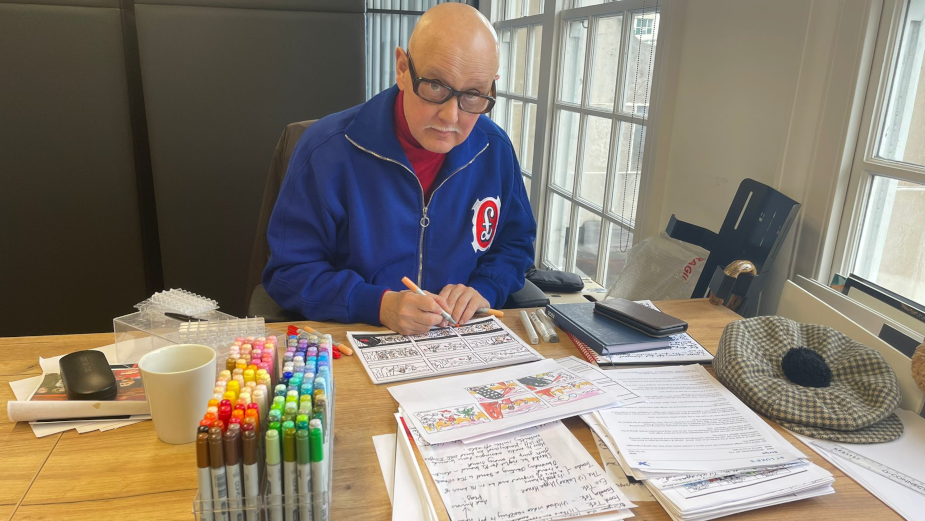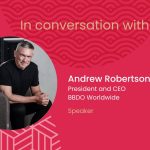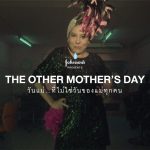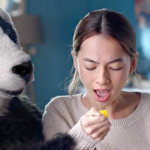Mark Denton’s creative credentials are solid. For 45 years he’s worked creatively, sometimes for brands, often just for fun. In his career he’s won awards for work he’s done for brands including Nike, Wrangler, Heineken, Levi’s and Greenpeace.
In 1988 he co-founded agency Simon Palmer Denton Clemmow & Johnson and in the ‘90s began a directing career that’s put him behind the camera for brands from IKEA to Aldi, PG Tips to Twiglets. For many years he’s been at the helm of Coy! Communications, a creative services and film production company.
Recently Mark found himself getting a bit bored. He’d just turned 65 and his agency days were years behind him. “I’ve missed working in the creative department ever since I became a director,” he says. “It was always great camaraderie, loads of very clever, great people to chat to and a great atmosphere. So despite the fact that I’ve loved being a director for 30-odd years, I always missed that.”
He’d also noticed the contact with agencies he had as a director had changed. “I’d seen the way that clients had a lot more say and I was a lot less protected as a director,” he says. “Suddenly I’d be on a shoot and find the client looking over my shoulder at my monitor, making comments about what he wants to happen. 20 years ago, there’d be a big gap between me and the client. There’d be three people keeping the client away from me so I could get on with my job. Now that’s not the case. And I thought, ‘why has it got like this?’” That thought made Mark wonder what it would be like to get back into a creative department after all these years.
In his typically direct style, Mark decided to apply for an internship at several agencies by putting the word out there. “I went on a little rant on Facebook. And before you know it, I’ve got this internship at St Luke’s,” he says.
Soon he was starting on his first day in a 21st-century London ad agency. “I really wanted it to be a direct comparison to the agency life that I left 30 years ago,” he says. He didn’t take his laptop, or accept the one the agency offered him, just relying on his mobile phone to use for emails, a set of magic markers and some layout pads. “Because that’s all I had in the old days to get my ideas across,” he says. “I thought let’s make it an experiment and see if pure ideas, communicated in the old way, pre-computer, have any value nowadays. So I stuck with that.”
“People looked at me in a bemused way. It’s like I was a caveman who’d turned up with a stone tablet and chisel. It was that extreme.”

One of the major shocks Mark had to acclimate to was a more collaborative spirit within the creative department, where ideas are shared and hammered out between creatives. “It’s alien to what I was brought up with because it was all about protecting your ideas,” he says. “That’s not a bad thing. It’s just different. It changes the way that you work.”
Presenting without the aid of a digital slideshow was something that made Mark stick out in this age of ‘decks’, and one culture shock that he found interesting to adapt to. But he enjoyed the opportunity to show another way. “Of course when I was presenting a script, I didn’t have lots of visual reference to rely on so I had to stand up and perform the script and enthusiastically present it. And again, there were people at the table looking at me, like, ‘where’s this bloke come from?’ Because it seems like people don’t do it that way anymore. They lose their audience by putting on a slideshow. You put your deck up, and then everyone’s looking at a screen and not looking at you anymore. So no performance is required.
“I like getting on stage and doing a performance. You’d have to ask them whether it was so bemusing that it really didn’t work at all. I don’t know. But after one meeting, a junior planner said that’s the best presentation he’s ever seen. They’d never seen anything quite like that before.”
The overwhelming stream of emails filling up Mark’s inbox terrified him. “That’s a big difference,” he says, adding that creatives’ calendars are also full of meetings. “So a creative’s time is less about having time to do the work. It’s about chatting about the work that you haven’t had time to do yet.”
It was all quite alien to the 65-year-old intern, but he wasn’t expecting the agency of the ‘90s that he last experienced. “Of course, you go back in after that amount of time and it is a different kettle of fish altogether,” he says. “I’m not saying the people are not just as brainy, clever, nice and talented. I only intended this to be a one off. But I enjoyed the process so much. I really did enjoy mixing with creative types again. They’re every bit as clever and funny and witty and all the rest of it as they used to be. And good to be around. I met some genuinely interesting creative people there. I’d love to keep in touch.”
And as different as their processes are, Mark has to commend the work that they achieve through them, like their NHS poster at the start of the pandemic, which Mark says was “magnificent”. He also loves the activation work the agency’s been doing for Butterkist. “They’re obviously very creative and they can churn stuff out. But the system is very different from the one I was brought up with. And as a result, I’m personally programmed to think in a different way and use my time differently.”
That said, by the end of the month, Mark had got his head around it “and I kind of enjoyed the collaboration thing as well, to share stuff and then other people share stuff with me,” he adds.
Also, he’d found a positive way of framing his experiences. “I genuinely felt that I was contributing. At my age you want to be useful,” he jokes. During his first week, Mark had discovered The Ad Contrarian’s newsletter where the respected advertising blogger Bob Hoffman suggested agencies of today should experiment with the idea of ‘Brains in a Bottle’ – a role that he thinks people like Mark could do.
“By ‘people like Mark’ I mean very creative individuals who know advertising inside-out and are probably ten times better at it than the average ‘creatives’ in your agency, but are retired or can no longer tolerate the stupidity of agency operations,” writes Bob.
“Some industrial companies used to have people called ‘senior scientists’,” the post continues. “I’m not sure if they still do. They were brilliant scientists who were treated as brains in a bottle. They were too smart and too valuable to be made to go through the hoops of daily corporate horseshit. Instead, their job was to sit in a corner and dream stuff up. An example: 3M had a scientist who was working with adhesives and discovered a very shitty, un-sticky type of glue. This became the basis for Post-It notes.
“Ad agencies, drowning in technology and starving for creativity, would be massively benefited by having these kinds of people around. I can think of half a dozen (at least) people I know who are retired from the business but would be incredibly valuable to any agency or marketing department. Just sit ’em in a corner and let them think about your hardest problems.”
Reading this was a revelation to Mark, who found himself at that moment an experienced, but slightly out-of-the-loop individual in a contemporary creative agency. He thought, “blimey, I’d like that job!”
Mark’s experience at St Luke’s confirmed to him that there are things that are missing from the past that have been forgotten about by agencies. “There’s a whole new generation of young creatives who have got no link with the past whatsoever because there’s no mature (for want of a better word) creatives in the department,” he says. “So they get no apprenticeship, they get no gurus. Everyone really has gotten a lot younger. People get promoted faster. There just really isn’t that voice of experience from the past.”
Mark felt that he could bring that kind of benefit to a contemporary agency like St Luke’s. “I definitely brought an alternative way of doing things into the office. You’d have to ask them if it was a distraction, or if it was any good, but I heard that some of my lines had been bought for a poster campaign.”
But that’s not saying Mark’s calling for a return to some sort of imaginary ‘good old days’. “Things do need to change. Because we were all being paid too much and being too indulged. There’s a middle ground. There’s a new model. Look to the past, not to repeat it, but to scoop up the assets before they die.”
“It can’t go back to what it was, but to be honest, I wouldn’t want it to go back to what it was. Because there are so many great tools now that we never had.”
Mark’s internship showed him that the contemporary creatives had plenty to teach him too. He marvelled at a lot of what is now possible. “There are so many better things now,” he says. “Someone gave me a Zoom chat about how TikTok works. And after that, I just thought I want to do a TikTok campaign. I’d never thought about it before. So the knowledge goes both ways.
“Making ads has never been easier, setting type, shooting videos, editing. You’ve got your own broadcast channel with TikTok and YouTube and the like. Broadcasting and advertising has never been easier. The thing I think that I and the people of my generation could add, is that I don’t think the most is being made of the technology. It is so wondrous to us what you can do now because we lived in age before that was around. I think we can see the potential of it more than the people who grew up with a video camera in their hand.”
Looking around a modern agency, Mark didn’t see enough space being made for creatives to develop. There was nobody with the time to pass on their knowledge, so the only kind of learning was on the hoof. The idea of the Brain in a Bottle – a person in the corner who can be visited at any time by anyone in the department – could fill this deficit. “I think that would be bloody useful,” says Mark. “Because the ECDs and creative directors haven’t got the time to pass on the knowledge anyway, even if they have the knowledge.” He also refers to the ‘freelance army’ that is filling so many roles in agencies now, often never even coming into the office physically before moving onto a job somewhere else, meaning their experience is never passed on to the juniors.
After a number of blog posts, diary pieces and a brilliant video he starred in, adland has been enthralled by Mark’s unconventional career choice. “Outside of the social media comments and all the rest of it, the direct messages I’ve had from all over the world have been bonkers,” he says. He’s even had an offer from a digital agency and a big network agency about going to be an intern there. Someone from New York said he should do more acting and pointed him to Hollywood. “It all feels like snowballs trundling down the hill in a very strange and interesting way,” he says.
Mark is happy to continue directing ads and he’s creatively fulfilled, he says. “I do all my own art and my creative work outside of advertising, so I get plenty of opportunity to spread my creative wings.”
But he can’t get the Brain in a Bottle idea out of his head. He says he’s keeping a more open mind to agency opportunities than he’d expected. “It’s opened up an area of interest. Bob Hoffman came up with a bloody interesting insight. It’s something that if someone offered me it, I’d be tempted. I’ve got 45 years worth of accumulated knowledge. I would think (he said arrogantly) it’s got to be worth something. But I’d like to see other experienced people taken on in the same role. I think it would improve the creative output generally.”
This article was first published on Little Black Book.
MARKETING Magazine is not responsible for the content of external sites.









